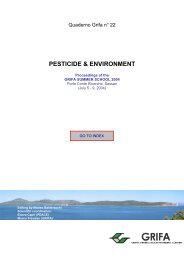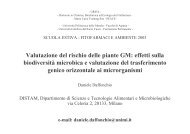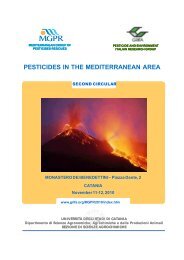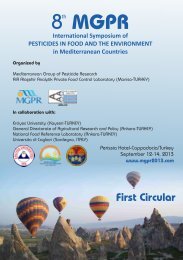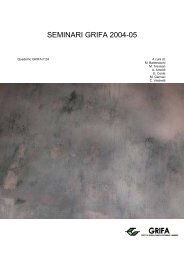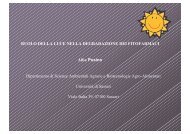International Congress BIOLOGICAL PRODUCTS - Gruppo di ...
International Congress BIOLOGICAL PRODUCTS - Gruppo di ...
International Congress BIOLOGICAL PRODUCTS - Gruppo di ...
Create successful ePaper yourself
Turn your PDF publications into a flip-book with our unique Google optimized e-Paper software.
NEED FOR RESEARCH AND APPROPRIATE ANALYTICAL TOOLS FOR ORGANIC FOOD CONTROL<br />
Yona Siderer a, and Elke Anklam b<br />
a Inter<strong>di</strong>sciplinary Centre for Technological Analysis and Forecasting, at Tel Aviv University, Ramat -Aviv, Israel<br />
b European Commission, Joint Research Centre, Food Products Unit, B -2440 Geel, Belgium<br />
Organic farming and the organic food market are growing fast. Due to health concerns, environmental consciousness,<br />
social status considerations and other reasons, consumers are interested in the products of organic farming. At the same<br />
time, they want more information about these products.<br />
Inspection procedures for confirming the origin of products seem to be insufficient and need to be supported by<br />
analytical tools. Not only should the products purchased on the market be checked for their authenticity but also<br />
products used during the various production steps (e.g. fertilisers, soil, animal feed, pesticides). Analytical research<br />
work should accompany the expansion of organic farming and organic food production. This should take into<br />
consideration <strong>di</strong>fferent climate con<strong>di</strong>tions, the variety of soils and soil constituents, the variety of plants and plants<br />
strains, and husbandry of livestock related to animal welfare. At the same time, the products (vegetables, fruits, milk,<br />
meat, and processed food) should be stu<strong>di</strong>ed for their own qualities.<br />
Research into agricultural crops with various cultivation methods and the resulting natural or processed food is complex<br />
and lengthy. It is very <strong>di</strong>fficult to compare the contents of nutrients and vitamins, as the constituents of such substances<br />
depend heavily on storage time, con<strong>di</strong>tions and technology. Fast and general answers cannot be given on methods for<br />
verifying authenticity and safety. Attention should be focused on the planning of experiments, taking into consideration<br />
many variable parameters like soil quality, climatic and geographical con<strong>di</strong>tions and crop variety. It is important to<br />
study a large number of samples, to be able to deduce meaningful conclusions from the results of the research. The<br />
research protocol should involve a large enough number of research participants as well. The results of such a<br />
combined study could then be used as analytical tools for assessing organic products. Later on, a farmer or a retail outlet<br />
would be able to add to the label that the product was checked and, e.g., found “clean” of pesticides, or that mycotoxins<br />
were found to be below legal levels after harvesting. These tests would be beneficial for interested customers and for<br />
the organic market sustainability. It should be emphasised that this approach of collaborative structured stu<strong>di</strong>es is<br />
preferable to the work of a single researcher wanting to study a particular question of her or his interest (or the<br />
stakeholder’s interest).<br />
Once analytical tools have been developed, firstly for a small number of products, but in higher numbers along the<br />
years, then legislation on organic food products might be changed to include a call for analytical tests to support the<br />
inspection system.<br />
PDF creato con FinePrint pdfFactory versione <strong>di</strong>mostrativa http://www.secom.re.it/fineprint<br />
23



